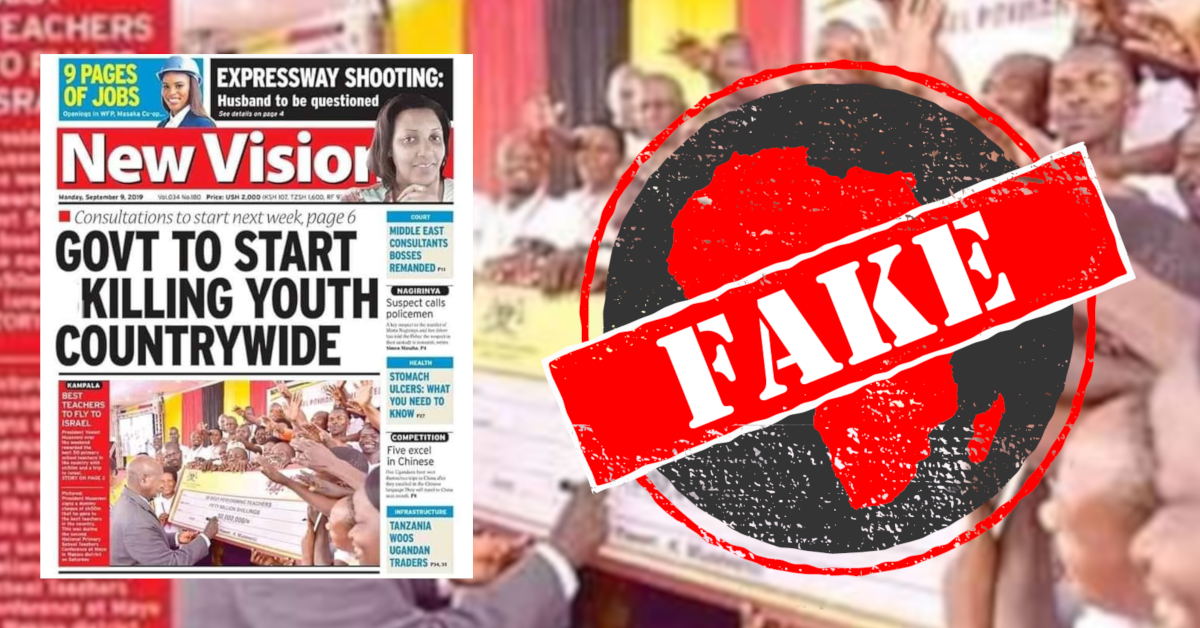“Govt to start killing youth countrywide,” reads the headline of what seems to be the front page of Uganda’s New Vision newspaper.
The graphic has been shared a number of times on Facebook, including on a popular Kenyan group page.
Here the caption reads: “I don't understand why the Uganda government wants to kill the youth. Hopefully our government will not follow the trend.”
It is easy for people to manipulate authentic images to drive their agendas online.
In August 2019 alone, Africa Check exposed fake versions two newspaper front pages: the UK Guardian and Kenya’s Daily Nation.
Is the New Vision front page making waves on Facebook also fake?

There are clear signs that the graphic has been manipulated.
A letter seems to be missing before the word “killing”. Smudges next to the K in “killing” indicate that the letter was digitally removed.
A reverse image search quickly reveals that New Vision exposed the fake in a tweet on 9 September 2019.
The newspaper posted the real front page from the day, next to the fake version shared online. “Please disregard the #fake Front Page going around,” it tweeted.
The original headline reads: “Govt to start skilling youth countrywide.” – Dancan Bwire
Further reading:
https://africacheck.org/fbcheck/image-of-julian-assange-holding-newspaper-report-of-plans-to-islamize-nigeria-was-photoshopped/
https://africacheck.org/fbcheck/hoax-alert-photos-of-joho-kutuny-on-daily-nations-front-page-photoshopped/
The graphic has been shared a number of times on Facebook, including on a popular Kenyan group page.
Here the caption reads: “I don't understand why the Uganda government wants to kill the youth. Hopefully our government will not follow the trend.”
It is easy for people to manipulate authentic images to drive their agendas online.
In August 2019 alone, Africa Check exposed fake versions two newspaper front pages: the UK Guardian and Kenya’s Daily Nation.
Is the New Vision front page making waves on Facebook also fake?

Clues image manipulated
There are clear signs that the graphic has been manipulated.
A letter seems to be missing before the word “killing”. Smudges next to the K in “killing” indicate that the letter was digitally removed.
Skilling youth, not killing
A reverse image search quickly reveals that New Vision exposed the fake in a tweet on 9 September 2019.
The newspaper posted the real front page from the day, next to the fake version shared online. “Please disregard the #fake Front Page going around,” it tweeted.
The original headline reads: “Govt to start skilling youth countrywide.” – Dancan Bwire
Further reading:
https://africacheck.org/fbcheck/image-of-julian-assange-holding-newspaper-report-of-plans-to-islamize-nigeria-was-photoshopped/
https://africacheck.org/fbcheck/hoax-alert-photos-of-joho-kutuny-on-daily-nations-front-page-photoshopped/
Republish our content for free
For publishers: what to do if your post is rated false
A fact-checker has rated your Facebook or Instagram post as “false”, “altered”, “partly false” or “missing context”. This could have serious consequences. What do you do?
Click on our guide for the steps you should follow.
Publishers guideAfrica Check teams up with Facebook
Africa Check is a partner in Meta's third-party fact-checking programme to help stop the spread of false information on social media.
The content we rate as “false” will be downgraded on Facebook and Instagram. This means fewer people will see it.
You can also help identify false information on Facebook. This guide explains how.


Add new comment